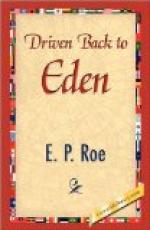As for Bobsey, he should have a pig which he could name and call his own, and for which he might pull weeds and pick up apples. We soon found that he was communing with that phantom pig in his dreams.
CHAPTER IV
A MOMENTOUS EXPEDITION
By the time Christmas week began we all had agreed to do without candy, toys, and knick-knacks, and to buy books that would tell us how to live in the country. One happy evening we had an early supper and all went to a well-known agricultural store and publishing-house on Broadway, each child almost awed by the fact that I had fifteen dollars in my pocket which should be spent that very night in the purchase of books and papers. To the children the shop seemed like a place where tickets direct to Eden were obtained, while the colored pictures of fruits and vegetables could portray the products of Eden only, so different were they in size and beauty from the specimens appearing in our market stalls. Stuffed birds and animals were also on the shelves, and no epicure ever enjoyed the gamy flavor as we did. But when we came to examine the books, their plates exhibiting almost every phase of country work and production, we felt like a long vista leading toward our unknown home was opening before us, illumined by alluring pictures. To Winnie was given a book on poultry, and the cuts representing the various birds were even more to her taste than cuts from the fowls themselves at a Christmas dinner. The Nimrod instincts of the race were awakened in Merton, and I soon found that he had set his heart on a book that gave an account of game, fish, birds, and mammals. It was a natural and wholesome longing. I myself had felt it keenly when a boy. Such country sport would bring sturdiness to his limbs and the right kind of color into his face.
“All right, Merton,” I said: “you shall have the book and a breech-loading shot-gun also. As for fishing-tackle, you can get along with a pole cut from the woods until you have earned money enough yourself to buy what you need.”
The boy was almost overwhelmed. He came to me, and took my hand in both his own.
“O papa,” he faltered, and his eyes were moist, “did you say a gun?”
“Yes, a breech-loading shot-gun on one condition—that you’ll not smoke till after you are twenty-one. A growing boy can’t smoke in safety.”
He gave my hand a quick, strong pressure, and was immediately at the farther end of the store, blowing his nose suspiciously. I chuckled to myself: “I want no better promise. A gun will cure him of cigarettes better than a tract would.”
Mousie was quiet, as usual; but there was again a faint color in her cheeks, a soft lustre in her eyes. I kept near my invalid child most of the time, for fear that she would go beyond her strength. I made her sit by a table, and brought the books that would interest her most. Her sweet, thin face was a study, and I felt that she was already enjoying the healing caresses of Mother Nature. When we started homeward she carried a book about flowers next to her heart.




